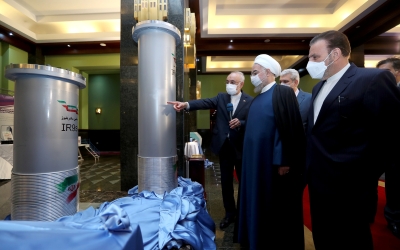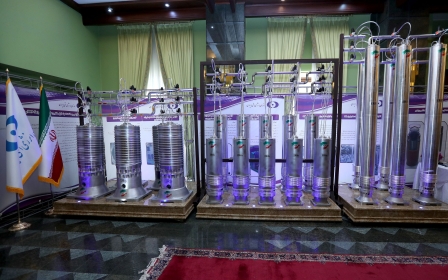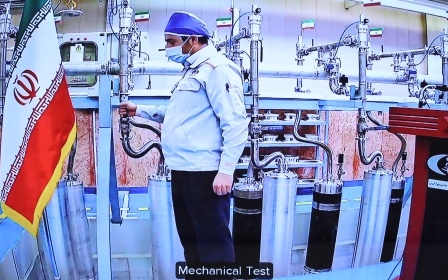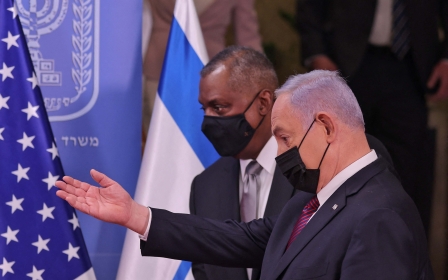Iran names man accused of Natanz nuclear plant attack

The man Tehran accuses of being behind the recent explosion at its main Natanz nuclear plant has been named by Iranian state TV.
Quoting the intelligence ministry, state TV said a man identified as Reza Karimi was wanted for last week's blast, which it blamed on Israel, adding that he had fled Iran before the attack.
Stay informed with MEE's newsletters
Sign up to get the latest alerts, insights and analysis, starting with Turkey Unpacked
Aired footage showed a photograph of what the TV station said was Karimi on a red card that had "Interpol Wanted" written on it. The card listed his age as 43.
"Necessary steps are underway for his arrest and return to the country through legal channels," the report said.
State TV also aired footage of rows of what it said were centrifuges that had replaced the ones damaged in the blast on 11 April at the Natanz uranium enrichment plant, Reuters reported.
It added that "a large number" of centrifuges whose enrichment activity was disrupted by the explosion had been returned to normal service, the report said.
Israeli media outlets have quoted unnamed intelligence sources as saying the country's Mossad spy service carried out the Natanz sabotage operation. Israel - widely believed to be the only Middle Eastern country with a nuclear arsenal - has not formally commented on the incident.
Uranium production 'unhelpful'
Talks to save the 2015 nuclear deal, aimed at curtailing Iran's nuclear capabilities, continued in Vienna on Saturday. Iran is demanding the removal of all sanctions imposed by former US President Donald Trump.
The talks were overshadowed by Iran's announcement on Friday that it had begun producing uranium at 60 percent purity, the latest breach of its commitments to the nuclear deal.
It declared its intentions on Tuesday, two days after the Natanz attack.
On Saturday, the UN nuclear watchdog confirmed the statements by Iranian officials.
"The Agency today verified that Iran had begun the production of UF6 enriched up to 60 percent… at the (above-ground) Natanz Pilot Fuel Enrichment Plant," the International Atomic Energy Agency said in a statement.
UF6 is uranium hexafluoride, the form in which uranium is fed into centrifuges for enrichment.
A confidential IAEA report to member states seen by Reuters provided more details.
"According to Iran's declaration to the agency, the enrichment level of the UF6 produced at PFEP was 55.3 percent U-235. The agency took a sample of the produced UF6 for destructive analysis to independently verify the enrichment level declared by Iran. The results of this analysis will be reported by the agency in due course," the report said.
Trump's successor, Joe Biden, said on Friday that the shift in Iran's uranium production was "unhelpful" but he was pleased Iran was still willing to engage in indirect negotiations on the US returning to the 2015 deal.
Middle East Eye delivers independent and unrivalled coverage and analysis of the Middle East, North Africa and beyond. To learn more about republishing this content and the associated fees, please fill out this form. More about MEE can be found here.





